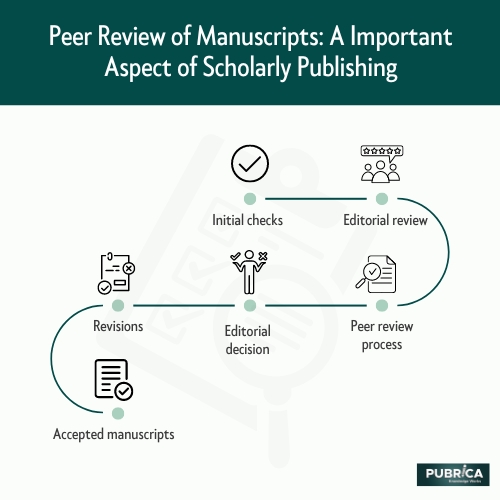Peer Review of Manuscripts: A Important Aspect of Scholarly Publishing
Peer review plays a crucial role in the process of scholarly publishing, serving as the cornerstone of scientific rigor, quality assurance, and knowledge advancement. It involves subjecting research manuscripts to the scrutiny of experts in the field before publication. This article highlights the significance of peer review in scholarly publishing and its impact on the scientific community.

- Ensuring Scientific Rigor: Peer review serves as a critical quality control mechanism, ensuring that research studies meet rigorous scientific standards. Experts assess the methodology, data analysis, and interpretation of findings, helping to identify any flaws or weaknesses. This process improves the reliability and credibility of published research.
- Validating Research Findings: Peer review provides an independent assessment of research manuscripts, validating the accuracy and significance of the findings. Experts evaluate the methodology, experimental design, and statistical analysis, ensuring that conclusions are supported by the evidence presented. This validation enhances the trustworthiness of research outcomes.
- Identifying and Correcting Errors: Peer reviewers often act as gatekeepers, meticulously reviewing manuscripts for errors, inconsistencies, or logical flaws. Their constructive feedback helps authors improve their work, identify research gaps, and rectify shortcomings. This iterative process promotes the continuous refinement of scientific knowledge.
- Enhancing Publication Quality: Peer review helps maintain high publication standards through critical evaluation and feedback. Reviewers offer suggestions to enhance manuscripts‘ clarity, structure, and organization, ensuring effective research communication. This process elevates the quality of published articles, benefiting readers and the scientific community.
- Facilitating Collaboration and Networking: Peer review fosters collaboration and networking among researchers. Reviewers can engage with cutting-edge research, expand their knowledge base, and establish professional connections. This exchange of expertise and ideas contributes to the growth and advancement of the scientific community.
Conclusion:
Peer review is vital to scholarly publishing, promoting scientific rigor, validating research findings, and improving the quality of published work. By providing expert evaluation and constructive feedback, peer review ensures that scientific knowledge is accurate, reliable, and impactful. As the scientific landscape continues to evolve, the importance of peer review remains paramount in maintaining the integrity and progress of scholarly research.
References
Koshy, Kiron, et al. “Peer review in scholarly publishing part A: why do it?.” IJS Oncology 3.2 (2018): e56.
